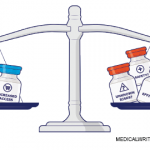NEW YORK (Reuters Health)—A biosimilar version of infliximab appears as effective as the original for treating pediatric inflammatory bowel disease (PIBD), and less costly, new research shows.
“These baseline data have now enabled us to confidently switch patients from originator to biosimilar, adopting the same prospective methodology to monitor effectiveness, safety and cost,” Dr. Lisa Richmond of the Royal Hospital for Children in Glasgow, U.K., and colleagues write in their Oct. 7 online report in the Archives of Disease in Childhood.1
The European Medicines Agency approved the use of biosimilar infliximab in PIBD in 2015, but initial studies showing biosimilarity had been done in adults with rheumatic disease.
Dr. Richmond and her team collected prospective data on 40 PIBD patients from two regional referral centers who started the infliximab biosimilar, Remsima. Twenty-nine had Crohn’s disease (CD), 11 had ulcerative colitis (UC). Napp Pharmaceuticals, which makes Remsima, helped fund the study.
Twelve weeks after treatment initiation, patients showed significant clinical and biochemical improvements. Two patients developed positive antibodies, one of whom had an acute infusion reaction. This patient had previously been exposed to Remicade, and was switched to adalimumab.
Remsima was 38% less expensive per vial than Remicade. The researchers estimate that the 190 total infusions patients received cost about 47,800 British pounds (US$ 62,866) less.
“Recent guidelines have generally advised caution in the use of biosimilar anti-TNFs until further data on their use have become available,” Dr. Richmond and colleagues write. “We hope this study will help support their wider introduction into paediatric practice.”
Dr. Richmond was not available for an interview by press time.
Reference
- Richmond L, Curtis L, Garrick V, et al. Biosimilar infliximab use in paediatric IBD. Arch Dis Child. 2017 Oct 7. pii: archdischild-2017-313404. doi: 10.1136/archdischild-2017-313404. [Epub ahead of print]

